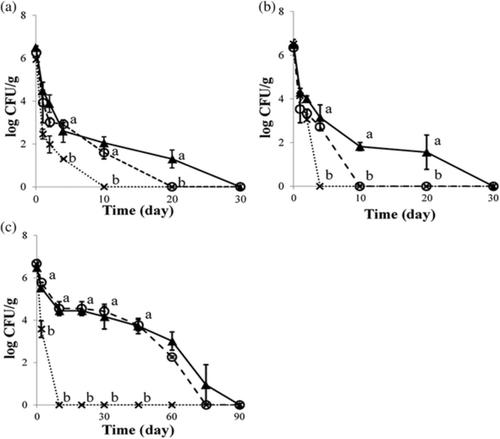当前位置:
X-MOL 学术
›
J. Food Saf.
›
论文详情
Our official English website, www.x-mol.net, welcomes your
feedback! (Note: you will need to create a separate account there.)
The fate of cold‐stressed or tetracycline‐resistant Vibrio spp. in precooked shrimp during frozen storage
Journal of Food Safety ( IF 1.9 ) Pub Date : 2020-04-05 , DOI: 10.1111/jfs.12798 Hye J. Moon 1 , Jeong Y. Lee 1 , Ju Y. Lim 1 , Su J. Kim 1 , Ki Y. Song 1 , Ki S. Yoon 1
Journal of Food Safety ( IF 1.9 ) Pub Date : 2020-04-05 , DOI: 10.1111/jfs.12798 Hye J. Moon 1 , Jeong Y. Lee 1 , Ju Y. Lim 1 , Su J. Kim 1 , Ki Y. Song 1 , Ki S. Yoon 1
Affiliation

|
We compared the fate of cold‐stressed (CS) or tetracycline‐resistant (TR) Vibrio parahaemolyticus, Vibrio vulnificus, and Vibrio cholerae in precooked shrimp during frozen storage. The recovery ability of viable but nonculturable (VBNC) Vibrio cells was compared at 25°C. Each suspension of nonstressed (NS), CS, or TR Vibrio cells inoculated into cooked shrimps were subjected to frozen storage at −20°C or three freeze–thaw cycles. CS and TR cells were more rapidly converted to VBNC state than NS cells. Most of VBNC Vibrio cells were observed as viable cells after frozen storage. Although there were differences in the recovery extent of cells depending on the types of stress and strain, VBNC cells were resuscitated at 25°C. The most resistant to tetracycline and the lowest injury rate were observed in V. cholerae cells during frozen storage.
中文翻译:

抗冷应激或四环素抗弧菌的命运。在冷冻储存的虾中煮熟
我们比较了冷藏后预煮虾中冷应激(CS)或四环素抗性(TR)副溶血弧菌,创伤弧菌和霍乱弧菌的命运。在25℃下比较存活但不可培养的(VBNC)弧菌细胞的恢复能力。将接种到煮熟的虾中的每种无应力(NS),CS或TR弧菌细胞悬液在-20°C或三个冻融循环下进行冷冻保存。CS和TR细胞比NS细胞更快地转变为VBNC状态。大多数VBNC弧菌冷冻保存后观察到细胞为活细胞。尽管根据应力和应变的类型,细胞的恢复程度有所不同,但VBNC细胞在25°C复苏。在冷冻储存期间,在霍乱弧菌细胞中观察到对四环素的最强抗性和最低的损伤率。
更新日期:2020-04-05
中文翻译:

抗冷应激或四环素抗弧菌的命运。在冷冻储存的虾中煮熟
我们比较了冷藏后预煮虾中冷应激(CS)或四环素抗性(TR)副溶血弧菌,创伤弧菌和霍乱弧菌的命运。在25℃下比较存活但不可培养的(VBNC)弧菌细胞的恢复能力。将接种到煮熟的虾中的每种无应力(NS),CS或TR弧菌细胞悬液在-20°C或三个冻融循环下进行冷冻保存。CS和TR细胞比NS细胞更快地转变为VBNC状态。大多数VBNC弧菌冷冻保存后观察到细胞为活细胞。尽管根据应力和应变的类型,细胞的恢复程度有所不同,但VBNC细胞在25°C复苏。在冷冻储存期间,在霍乱弧菌细胞中观察到对四环素的最强抗性和最低的损伤率。










































 京公网安备 11010802027423号
京公网安备 11010802027423号